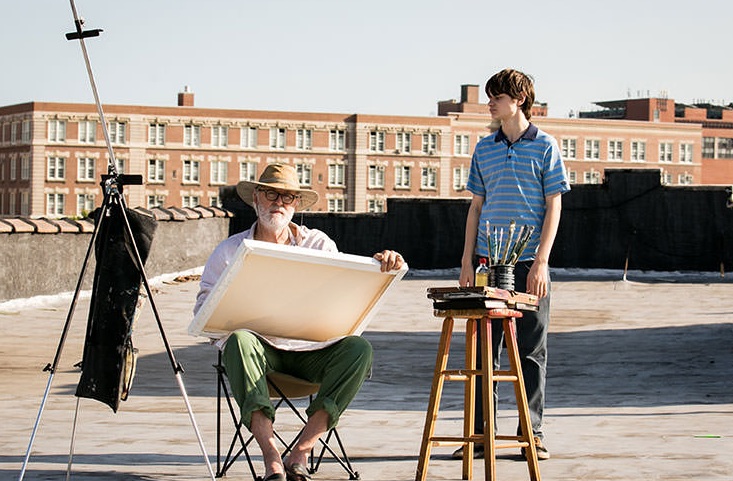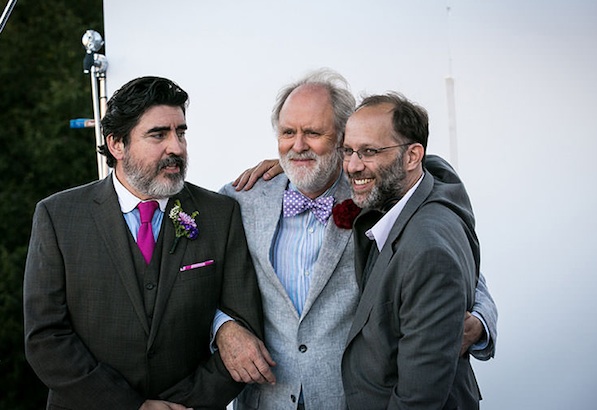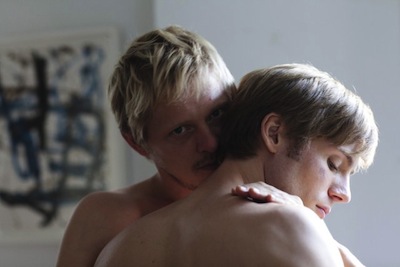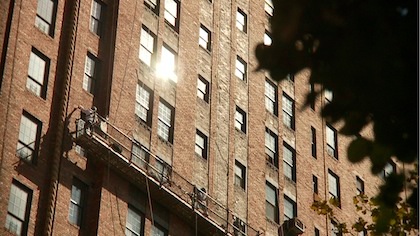“What I love about ‘Ben’ and ‘George’ is what I love about John and Alfred,” says Ira Sachs evenly. “They have humility and they have confidence as people, which makes you want to be around them.”
Ever since Love Is Strange premiered at Sundance, people have found a lot to love about these actors and the characters they play in Sachs’ film: a gay couple who after having been together for nearly forty years find they are able to marry—which results in a series of complications that force them to love apart. The rise of same-sex marriage makes it very much a film “of the moment,” but for Sachs it’s a film whose principle characters, while far older than he is, are very close to his heart. On the last lap of what’s turned out to be a de facto tour with the film since its premier, Sachs has had a lot of time to reflect on what Love Is Strange means to him as well as others, and why “Ben” and “George,” have touched so many people, straight as well as gay.
“They’re not neurotic. Nothing against neurosis but it’s sometime repellent. It’s nice to be around people who like themselves,” says Sachs, referencing his last film, Keep the Lights On. “The end of Keep the Lights On is where this movie comes from. Love Is Strange reflects in tone that in my forties something shifted in my life, and that’s what I mean by its relation to my previous film.” Keep the Lights On was based on Sachs’ tumultuous relationship with Bill Clegg, a literary agent who published his own memoir of their affair and his drug addiction, Portrait of an Addict as a Young Man, in 2010. Starring out gay Danish actor Thure Lindhardt (in the Sachs role) and Zachary Booth (in the Clegg one), it’s a scorching no-holds-barred study of a toxic love affair that after any number of twists and turns (the most unsettling featuring Lindhardt holding Booth’s hand as he’s mounted by a high-class hustler) ends on a note of calm with the former lovers bidding one another farewell without bitterness or regret.
“At the end of that relationship I actually came out,”‘ Sachs declares. “I’d been out since I was sixteen in a technical way. But I was now in a different place. I guess what I mean is that for my generation, there was a residual discomfort I had with myself about being gay in the culture that has taken me a long time to work through. Coming of age in this society was totally forbidden to gay men of my generation. I keep thinking about Nothing but a Man, Michael Roemer’s great film about a black man and his wife and how racism affects them. That film to me is the single best example of how culture can destroy lives. The beauty of their love at the beginning of the movie as opposed to the coercion that occurs across the course of the film really defines how we are affected by politics. The world has changed in the last ten years for gays and lesbians, and now the laws are changing with marriage equality coming into play What my film reflects is how that change affects the individual. Negatively because ‘George’ is fired from his job as a choir director at at Catholic school because he married ‘Ben,” but also positively because of the hopefulness of the story of what happens to them afterwards—the way their friends and family help them out. Like the two men I met last night at the Chicago screening, one of whom had been fired from his job of seventeen years of working for the Catholic Church, because of getting engaged—not yet even married—to his partner and somebody read bout it on Facebook. Death by Facebook!”
In Love Is Strange George’s firing upends the couple’s finances, forcing them to sell their apartment and look for a new one. Gorge bunks with the policewomen, a couple of hard-partying gay cops (Cheyenne Jacksona and Manny Perez) while Ben stays with his loving niece (Marisa Tomei), her very nice husband (Darren E. Burrows) and their surly teenage son (Charlie Tahan), who resents his uncle’s intrusion, but by the story’s end is the one most emotionally affected of all. Almost all of it, says Sachs came from real life.

“When I met Boris [Sachs’ husband, artist Boris Torres whose paintings are used in the film] he was living with a man named Michael Zimmer. It was the late seventies and they shared a town house. Michael was on the first floor, Boris was on the second floor and on the top were two gay cops. They all had dinner together and it was this Tales of the City kind of life. Michael is where we got Ben’s wardrobe from.”.
“You know,” Sachs continues, this film might be said to ‘honor’ the gay couples who came before, like Christopher Isherwood and Don Bachardy. You might say I’m honoring my gay parents—two men of a certain generation who I feel are precious. But they don’t have to be married for me to honor them. Like the ones I honored in Last Address, the film I made about all those artists who died in the AIDS epidemic.”
“Love Is Strange does not seem like a radical film, but it’s radical within the context of American cinema,” Sachs notes. “It’s not radical in form. But there were fifteen years when I didn’t have gay characters in my work and I was figuring out some way to include them.” Indeed Sachs’ history is that of a gay filmmaker who began in a somewhat radical mode with The Delta (1996) then moved on to Forty Shades of Blue (2005) and Married Life (2007), two films without any gay characters at all. Keep the Lights On was thus a radical change, and so is Love Is Strange, marking the fact that as society has changed. Sachs has been canny enough to keep pace with it.
“People find there’s a lot of identification. I think of it as a combination of empathy and analysis. I wanted the film to be about the affect we have on each other — generationally and communally. That’s how to honor the past and look towards the future.






